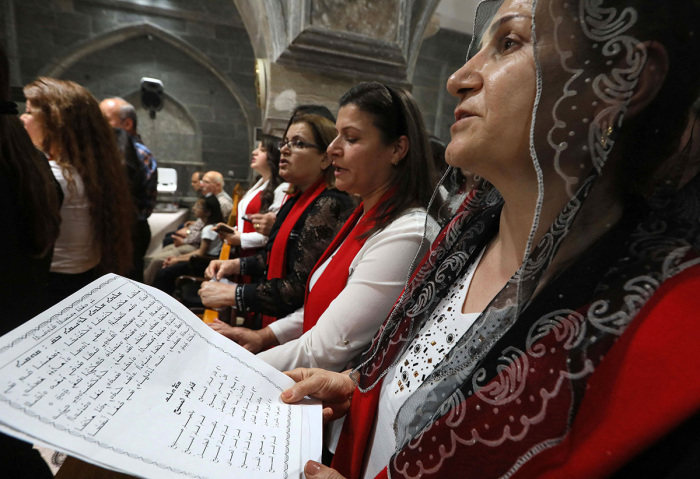
Two historic churches in Mosul, Iraq, have officially reopened after years of restoration, nearly a decade after their destruction during the Islamic State’s occupation. The reconsecration ceremonies marked a rare moment of revival for the region’s dwindling Christian population.
On Wednesday, local residents, clergy and international officials gathered to inaugurate the Church of Saint Thomas, a Syriac Orthodox site dating to the seventh century, and the Chaldean Catholic Church of Al-Tahira, also known as “The Immaculate.”
Fadi, a 27-year-old Christian from Mosul who trained for three years to help the restoration project, told Vatican News that the reopenings are “a sign of hope” for displaced Christians.
“It shows the Christians living abroad that things are better here now, that they can move back home,” he said.
Both churches are located in the Old City of Mosul, where IS forces had once established control between 2014 and 2017. During that period, the Church of Saint Thomas was converted into a prison, and Al-Tahira was bombed and left in ruins.
The churches’ restoration began in 2022 as part of a wider initiative to revive cultural landmarks in post-conflict zones. The Aliph Foundation, an international organization focused on heritage protection, led the project in collaboration with Iraq’s State Board of Antiquities and Heritage. The Paris-based Catholic charity L’Oeuvre d’Orient managed the day-to-day restoration work under the guidance of France’s National Institute of Heritage.
Mosul’s Christian population, once 14% of the city, has now shrunk to fewer than 60 families in a city of nearly 2 million, reports the Catholic non-profit media outlet Zenit.
“These churches are not just stones. They are the memory of faith, history, and community,” Archbishop Najeeb Michael Moussa, the Chaldean bishop of Mosul, was quoted as saying after the ceremony.
The restoration, he added, showed that “faith can be wounded but not extinguished,” and that each bell strike “calls not only the faithful, but the future.”
Teams first cleared mines and explosives from the sites before beginning reconstruction. Among the carefully restored features was the 13th-century alabaster door of Saint Thomas, carved from local marble known as farsh and depicting Christ with the twelve apostles.
Church bells cast by the Cornille Havard foundry in Normandy now ring out again over Mosul. The same foundry restored the bells of Notre-Dame de Paris, Zenit notes.
Inscriptions on the bells include the phrases “The truth will make you free” and “Peace I leave you, my peace I give you.”
The reconsecration of Mar Toma took place in an Orthodox ceremony, while the rededication of Al-Tahira followed on Thursday.
The secular inauguration, held jointly for both churches, marked the official public reopening of the buildings to the people of Mosul.
Patriarch Louis Raphaël Sako, head of Iraq’s Chaldean Church, presided over the reopening of Al-Tahira. He was joined by Syriac Orthodox Patriarch Mor Ignatius Aphrem II, Iraq’s Minister of Culture Ahmed al-Badrani, Nineveh Governor Abdul Qadir al-Dakhil, French Ambassador Patrick Durel and representatives of UNESCO and Œuvre d’Orient, Syriac Press reported.
Sako described the reopening as “not merely about restoring stones, but about restoring trust — a message of peace and hope for the people of Mosul and all Iraq.” Recalling the 13 Chaldean churches and three monasteries that once existed in Mosul, he said most now stand abandoned. He reminded those present that Mosul “was a Christian stronghold long before the arrival of Muslims at the end of the seventh century.”
Addressing the crowd, he called for “mutual trust and human, fraternal, and national relations,” warning that “extremism and sectarianism can never build a state or peace.” He stressed the need to rebuild society “upon the values of brotherhood, respect, and acceptance of others.”
In a direct rebuke to the Iran-backed Babylon Movement, a political party in Iraq led by Rayan al-Kildani, he stated, “We Christians have no militias, and if such groups exist, they have nothing to do with Christian ethics, and we do not recognize them.”
He urged that Christians in Iraq must be able to live with full and equal rights under coherent legal, political and security strategies.
Mar Toma is believed to be built on the site where the Apostle Thomas stayed en route to India, while Al-Tahira commemorates a Marian apparition said to have protected the city from Persian invaders in 1743. Both churches had long served as points of unity among Christians and Muslims in Mosul.
The restoration of the two churches was part of Aliph’s “Mosul Mosaic” program, which aims to rehabilitate cultural landmarks damaged during conflict. Before rebuilding began, teams had to remove landmines and unexploded ordnance left behind by IS forces.







